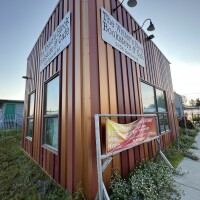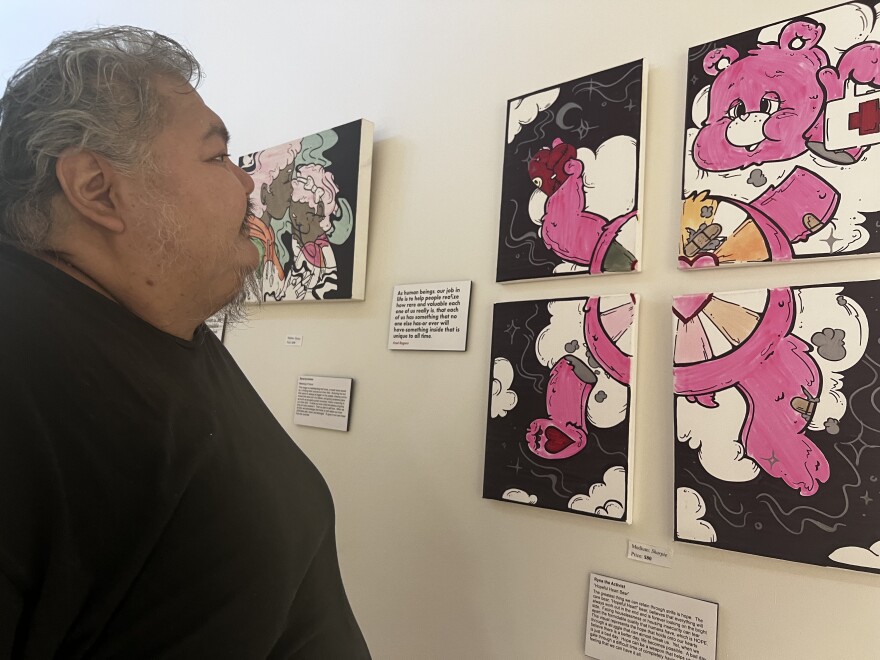
As those who live in summer camps make the transition to winter shelters, a traveling art exhibit in Anchorage has come to an end.
It asked those who can afford housing -- and those who can’t – to explore the “meaning of home.”
The relationship between the two groups is not one in which people meet on equal footing, except to share the sidewalks and parks at an uneasy distance.
A non-profit called Keys to Life, has tried to bridge the gap with an exhibit, which featured the art, poetry and music of those who must make a home wherever they may find it.
The project ended where it began five months ago, at the Brother Francis Shelter, where Keys to Life asked people at the shelter to turn their stories into art. The pieces became part of a traveling collection that went to five locations – the Akeela Space gallery downtown, Covey Academy at Covenant House, Kaladi Brothers on Brayton Drive, Writer’s Block in Spenard and finally, the Brother Francis Shelter.

At each location, a group of local musicians provided entertainment and included performers like Mary Johnson, who has lived in and out of Anchorage shelters over the last few years.
Her difficulties haven’t diminished the power of her voice and the songs she writes.

“I remember feeling all alone,” she sings. “The cold, lonely streets was my home. Going without anything to eat. Wondering where I lay my head and feet.”
Mary says it’s unusual for people living in shelters to be invited to public events like First Friday gallery openings.
“It's nice to fit in,” she said. “They always say the home is where the heart is. Right? My heart is so happy when I'm with this group of people.”
Homeless people are rarely held up for admiration. But as part of the project, Mary recorded two songs on a CD.

Along with the music, there are canvases on the wall with placards that tell each artist’s story.
Shirley Mae Springer Staten, the head of Keys to Life, estimates that, over the summer, about 14 thousand people saw this exhibit as it moved around town. Many were surprised to see so much talent.
“I think what was powerful about it was the unexpected,” Springer Straten said, “We have our own lens about individuals who live in our community and the hierarchy of those individuals.”
Some of the first pieces in the collection were painted in the art room at the Brother Francis Shelter, where Sister Lucia Lam Nguyen helps out.
“Many stories I cannot speak completely about or cannot share,” said Sister Lucia, a St. Vincent de Paul, Daughter of Charity. “I can only share through the arts, because it’s my feelings in there, my thinking in there, and many more.”
She believes it’s the same for the people at Brother Francis Shelter, who struggle to be heard in a world where no one wants to listen – but she believes the language of art can give everyone a voice.
Each painting in the collection speaks to Sister Lucia, like the one Robert Banks painted of a homeless man, who warms himself at a fire in a barrel. An angel hovers above him.
“The angel is so big,” she says, commenting on the size of the man, who is so much smaller in scale compared to the angel.
There’s a poem on the canvas in which Banks thanks God for sending an angel to watch over him.
“He keeps the fire burning inside my heart and soul,” Banks writes. “He gives me the courage to keep trying, proud, and bold.”
Banks was not to be found at any of the evenings the exhibit opened at a new location, yet his painting made an impression on many who came to see the exhibit.
“It’s a beautiful message, a very strong message about his faith in God,” Sister Lucia said.
The exhibit also has photographs -- some were taken by Aaliyah Koenig, who gave birth to a baby at 16. Although she didn’t raise her daughter, she spent her teenaged years couch-surfing.
“I felt like I was a burden,” says Aaliyah, who sometimes found herself in what she called life and death situations as she sought shelter.
She says survival on the streets takes a lot of work, contrary to what people say.
“Oh, just another homeless person out on Anchorage, doing drugs, drinking. Not really worried about anything,” said Aaliyah about the perceptions of homeless people. “But in reality, they worry about everything constantly. 24-7. Am I going to eat today? What can I use to stop that hunger?”
When things got too tough, Aaliyah said she would try to get thrown in jail.
“Well, being incarcerated. It’s like free food. A roof over your head. Clothes,” she said.
At Covenant House, she broke the cycle. And along the way, she discovered a talent for photography.
For the exhibit, she snapped shots of a path through some snowy woods.
“I see something, and I want others to see the breathtaking beauty of it,” she said.
She says such places always made her feel at home, even when she had no home.
“You’re not thinking about your worries. You’re not thinking about stuff that you’re going through,” Aaliyah said.
Just before the exhibit opened, Melissa Craig, Covenant House’s student program manager, gave Aaliyah a private tour.
Aaliyah almost didn’t recognize her work, nicely mounted on the wall.
“Are those mine?” she asked. Craig assured her that they were.
“I still feel joy when I see this, because I remember freezing to death, and you just tromping out of the car with your camera,” Craig laughed.
Aaliyah beamed with pride but said she wouldn’t go to the opening, because she gets overwhelmed in a crowd.

And it definitely was a high energy afternoon, when about 50 people streamed into a large room at Covey Academy, which offers training programs for its residents.

They lingered to study the art, both the students and members of the public who had never been to Covenant House before. Poems were also shared, including one from Bo Morning, another young person who turned to Covenant House for shelter.
“My warmth spreads a fraction further. My understanding, a fraction deeper. I am trying,” Bo read. “I am alive.”

Bo also had paintings on exhibit, including an abstract figure surrounded by color. A tiny book floated in the clouds, with a question written on its open pages: What are we but a collection of stories?
Bo was also one of five artists who shared their stories at the Writer’s Block, a cafe which has a homeless camp across the street.

“The idea that we're hosting an event, examining what the meaning of home is, while there is actually a tent camp across the street from our business, I don't necessarily think of it as ironic,” said Vered Mares, one of the owners of the cafe. “I think of it as ever more important to have that conversation.”
It was also a chance for the audience to learn about the root causes of homelessness.
Bo’s mother was deeply addicted to drugs – and as she spiraled downward, Bo was caught in the undertow, battling mental health problems, which ultimately led to a decision to leave home at the age of 18.
Suddenly Bo found herself alone in a world with little empathy for those on the streets
“We are just a problem, not people,” Bo told the audience. “Don’t like spit on my face right now, because I’m saying this is difficult.”

For most everyone on the panel, childhood trauma is a common thread.
“If you asked about my childhood, it’s only in fragments,” said Ryna Lealai, who told the group she felt so unsafe at home, she ran away and settled in for the night at a downtown park. She was only 17.
“I absolutely chose the streets, but this is a significant part of my story,” she said, as she described how an elderly Native man saw her trying to sleep against a tree.
“I thought he was like a weirdo,” she said, but now believes the man, who was also homeless, appeared at exactly the right time, almost like a spiritual guide.

The man warned her about the dangers of life on the streets and convinced her to go to Covenant House, where she found a place to live and eventually a job. Today, she helps other young people navigate systems, she says, that don’t always make a lot of sense, like Mayor Dave Bronson’s proposal to offer people in homeless camps, plane tickets out of Anchorage.
“I think he needs to build intentional relationships,” said Ryna in exasperation. The audience laughed and applauded.
Then, in a more serious tone, she added, “I really think he needs to have conversations with, not the people beside him, but before him and in front of him. It’s not hard to walk up to somebody and say, if you would like, can I sit with you, and can you tell me about your life?”
When the Meaning of Home exhibit came to the Brother Francis Shelter, Eldon Dotomain spent a long time taking in Ryna’s colorful pop art piece, called Helpful Heart Bear, sketched with Sharpie pens. The bear holds a first aid kit in one hand and a stitched-up heart in the other.

“It depicts an explosion from within, still trying to hold it together in a world that seems to be falling apart right now,” said Dotomain, who has been on the streets not just recently, but for a period a decade ago.
This time, he says, homelessness has spread like an unchecked virus, allowed to become an epidemic -- where society increasingly distances itself, not from just the situation but from the people.
“You can notice the separation when somebody says, ‘Hey. This is my address’ When they found out it’s a shelter, people kind of separate themselves,” Dotomain said.
Dotomain says he’s been sober for a year and is working hard towards a fresh start. He says the Meaning of Home project has helped to bring people together – and what he likes best is the connecting thread through the exhibit. Hope.
Shirley Mae Springer Staten says Robert Banks, the artist who painted the man warming himself at a burn barrel, called his piece, “Hope.”
“Sometimes when you lose hope,” she says, “what brings hope to your life is somebody believing in you doing or expressing talents that you know you have, but nobody asks.”
Staten Springer says the “Meaning of the Home” exhibit asks important questions, but the project itself is only a part of the answer.
“I say very candidly, this art will not solve homelessness,” Springer Staten said.
What she does believe is that the project has helped to move the city’s conversation about homelessness from the head to the heart, an important first step.


